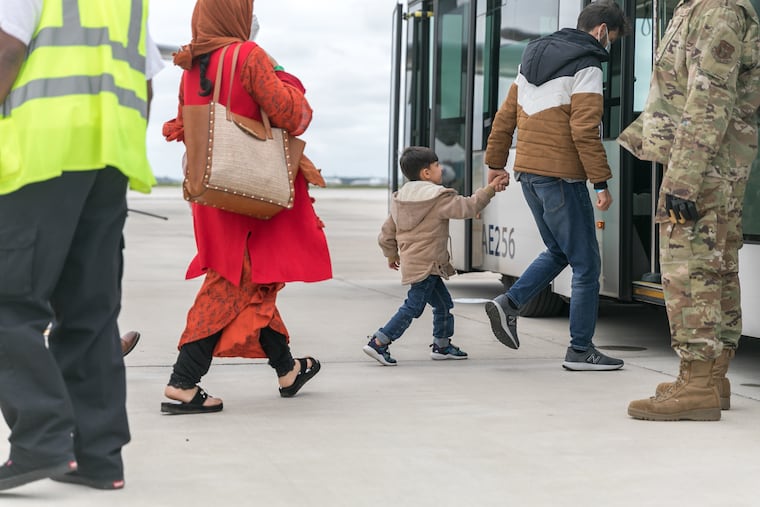I was an officer in Afghanistan. Here’s what I want Americans to know as we welcome refugees. | Opinion
I deployed to Afghanistan twice during the United States’ 20-year war.

I deployed to Afghanistan twice during the United States’ 20-year war. While there, I had the privilege to work directly with the people of Afghanistan, civilian and military, and be welcomed into their homes. They were excellent and generous hosts to me and my team, and I implore my neighbors in Pennsylvania to be equally welcoming to evacuees from Afghanistan.
When we initially arrived, we were greeted with respect and courtesy, I believe, in part, because our hosts were happy to have our technology and assistance with keeping the Taliban out of their daily lives. We were invited to the home of a district leader for dinner soon after arrival. We washed our hands on the way into the dining room and sat around a low table filled with spiced meats, fruits, bread, and vegetables. It was tasty and delightful, a welcome break from MREs (our cold and shelf-stable rations) and junk food.
» READ MORE: Nearly 1,000 Afghanistan evacuees have landed in Philly, with hundreds more expected
After the meal was cleared, we lounged on mats and discussed military and political strategies for the future of Afghanistan. We heard stories of the dead being left to rot in the streets after the Taliban takeover of Mazar-i-Sharif, where we were then deployed (and where reportedly at least six evacuation airplanes were stranded as of Wednesday). Our hosts and their families had been driven into the mountains with nothing in 1995, some seeing their loved ones succumb to fatal hypothermia. It was a tragic recalling.
Later in my first deployment, our hosts generously asked us what the tradition was around Christmas time. We had a somewhat hilarious discussion about what turkeys are — picture a soldier in full combat gear clucking “gobble-gobble-gobble!” — since they had never seen a turkey before and we had no way to show them images. On Christmas, they made us another wonderful meal, which we shared on our little base sitting at a table and exchanging gifts.
Though we had formal discussions at various headquarters, we later were invited to the homes of our counterparts, including fighters, civilians, and our translator. During one meeting and meal at our host’s home, he suddenly got a radio call. Through our interpreter, I discovered that there was a small party of Taliban trying to sneak into the northern part of town. A few minutes later, we heard several gunshots and were told that the threat had been eliminated. We never found out who they were or exactly how many, but I am confident we were included in the targets that these adversaries wanted to kill. We were protected by our partners.
» READ MORE: After Kabul bombing: A tale of two Afghan women, one who escaped and one who cannot | Trudy Rubin
Another aspect of the Taliban rule was preventing women from studying, let alone working as doctors. And male doctors were not allowed to see female patients unless they were part of their family. So, many women did not get medical care beyond what their families could provide between 1995 and 2001. We were lucky enough to be able to provide that care and served thousands of Afghans at a clinic run by our medic and transport some to a coalition field hospital, including women. At one stage before the clinic was up and running, we were even invited to the home of our interpreter to diagnose and treat a problem his wife was having. We strove to remain culturally sensitive and provided what care we could.
The evacuees arriving here are probably never going back, and likely have come here with nothing. I cannot imagine how it would feel to flee my home forever with just the shirt on my back and part of my family joining me, if I was lucky enough to get them out. Now, at the end of a long 20 years, I am glad to see we can help them begin to recover their lives in their new country.
Many Americans are already embracing this responsibility. I implore other readers to trust the intentions of arriving Afghans, as they trusted ours; invite them to share in our culture; be sensitive to their culture, as they were sensitive to ours; and protect them from ill-treatment, as they protected us. While a lot of attention has recently gone to the difficulties in the U.S.’s departure from Afghanistan, this should not affect how we treat our guests and neighbors. Let’s not forget that Americans and Afghans have worked together successfully before, continue to do so, and will again.
Daniel Vinsand is a retired Army lieutenant colonel who served for 24 years, including two deployments to Afghanistan.